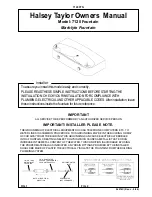
6
If you choose to vary from these instructions your
warranty will be impaired.
If you need advice, call us
FREE
on
0800 807 433
or email us at [email protected]
!
i
DIAGRAM 6
DIAGRAM 7
DIAGRAM 8
L FLASHING
Rivet through the side of
the ‘L’ flashing to secure the
roof to the side of the shed.
DIAGRAM 9
Use the handle end of a hammer in the
inside of the corner, but beware of drilling
holes on the end of your hammer!
GARDEN MASTER TIP
STEP 6:
INSTALLATION
WALL ASSEMBLY
Stand up the back wall and as your helping hand is holding it up, bring the left end
wall in to meet it at the left corner (diagram 6) overlapping the corners (diagram 7).
Drill and rivet at approximately 100mm down from the top and up from the bottom,
drilling and riveting from the outside.
Bring the right end wall into the right back corner and perform the same again,
checking to make sure the walls are sitting flat at the bottom. Bring the front wall into
place and join the front corners to the end walls, same as the back (diagram 8).
Finish joining the corners by riveting at approximately 200-300mm apart. You will
find it easier to drill these corners if they are supported on the inside (see tip).
FIXING THE ROOF
With a person at each end of the roof, lift it over the top of your upright walls and
lower down on top with an overhang that looks best to you (diagram 9). At the left end
rivet through the ‘L’ flashing into the top channel of the left end wall.
Measure the overhang at the back and rivet the right end ‘L’ to the right end wall
with the same overhang as the left end. If it is difficult to get the same overhang at
each end, this will be caused by an unlevel site or walls that are not square. Adjust
accordingly. Rivet the ‘L’s at 300mm apart.
Using the ladder and the tape measure, rivet down through the top of the roof, through
the pan into the top channel of the front and the back walls (10mm more than the
overhang). Rivet beside every second rib. You will not need to worry about these rivets
leaking as any water seeping through will end up on the outside of the walls.
FIT THE DOOR BRACES AND INSTALL SHED
Fit the door braces, if not already done so. Check that all filings/swarf is removed.
IMPORTANT:
FIX YOUR SHED TO ITS FOUNDATIONS
If your foundations are unlevel or bowed, you will have problems with
your padbolt and door levels. This can be fixed by slipping a spade under
either door jamb and lifting. You will soon get a feel for which side needs
propping up.
IMPORTANT:
•
Do not attempt to assemble panels in rain or windy conditions.
•
Make sure your foundations are squared and level before erecting panels.
•
It is easier to remove all swarf (filings) before you stand your walls up.
•
Complete all panels before erecting your shed.
•
Keep a firm grip on panels when handling. If they slip they will cause damage.
•
Always wear non-slip gloves, protective footwear and eyewear.
It is essential that every shed has a floor, but the only way to make sure your
shed is there to stay on windy sites is with a recessed concrete floor.
Phone
0800 807 433 for free advice or see page 7 for more details.
IMPORTANT GARDEN MASTER HINTS & TIPS
BUILDING YOUR SHED
The basic task is to join the sheets together
to form your panels, then rivet the channels
to the top and bottom of these panels. They
will then join together to form your shed
(diagram 6, 7, 8 and 9).


























